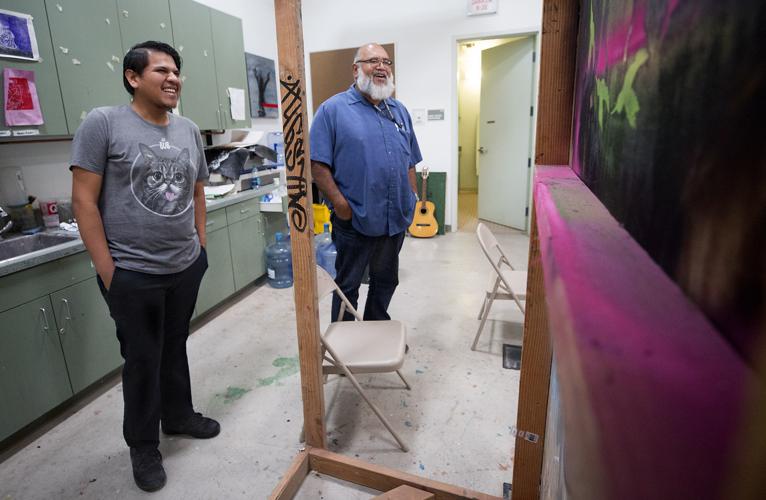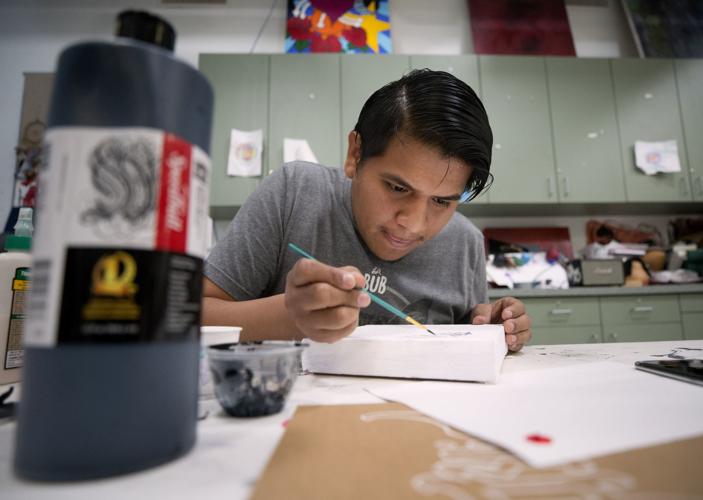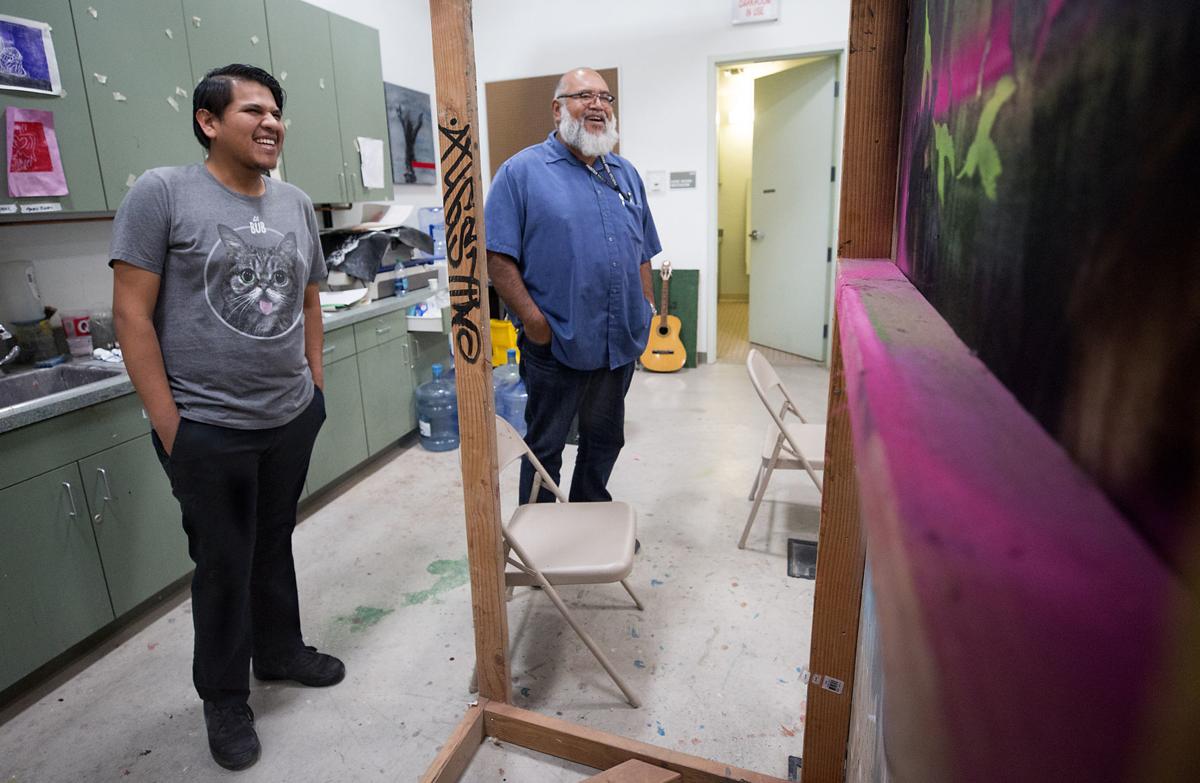Phillip Molina had a rough start, constantly being moved and shuttled among lots of strangers.
That’s sadly typical for many teens and children in foster care, especially those living in group homes as he did. But Molina, now 24, was eventually able to return to his roots in the Pascua Yaqui Tribe.
And while much of his growing up happened off the reservation, his chances for a better future improved when he was welcomed to the home of a Pascua Yaqui relative.
Group homes are something experts agree should be avoided for kids — especially for the long term — because children need one-on-one time and attention from an adult.
It’s now also widely accepted that when children can’t be with their parents, placing them with kin is far less traumatic than having them live with strangers, not only because relatives are familiar but also because there is a greater chance of learning about family culture and heritage.
This grounding in tradition and customs is an especially important part of the Indian Child Welfare Act, or ICWA.
The law requires state caseworkers to notify tribes when a child taken into custody might be a tribal member or eligible to become one. After that, depending on the circumstances, the case could be transferred to the jurisdiction of the tribe.
ICWA, often referred to as foster care’s “gold standard,” emphasizes placements with relatives over strangers’ homes and family settings over group homes. If a tribal relative, a non-tribal relative or a tribal member’s home is not available, the next-best placement would be the family of another Native American tribe.
The federal law was adopted in 1978 after decades in which up to 35 percent of Native American and Alaska Native children and teens were removed, without tribal consent, by state child welfare and private adoption agencies. About 85 percent of these children were placed in non-tribal foster and adoptive homes, far from their tribal communities and extended families.
Gauging how states and tribes are doing with ICWA compliance can be challenging due to privacy restrictions, a lack of data and, sometimes, a reluctance to talk about a law that’s being challenged in courts around the country. No one with the Pascua Yaqui Attorney General’s Office contacted for this article would agree to be interviewed.
But a recent report shows the Pascua Yaqui tribe has more than doubled the number of ICWA children being placed with tribal relatives or tribal members over the last decade.
The challenge is in finding more ICWA-compliant foster homes among Pascua Yaqui tribal members, who live throughout Arizona as well as on a reservation a few miles west of Tucson.
Finally at home
Until he was in high school, Molina mostly lived off the reservation in group homes, behavioral health centers and, twice, in therapeutic foster care with families that were not Pascua Yaqui or related to him.
Sometimes he landed as far away as Maricopa County, but when he was here, closer to home, he’d often run away to his grandmother’s house. Molina says he longed to live there, with his two older siblings, but there wasn’t room.
As a young adult, he now sees that he was stressed by moving so often and having to live with people new to him. As he grew and learned to better deal with the anger and grief that often overwhelmed him, Molina longed for one-on-one attention.
That wish was fulfilled when David Moreno, a Pascua Yaqui traditional arts instructor, offered Molina a place in his home.
Moreno first met Molina years before because they are distantly related. They became reacquainted at a group home for Pascua Yaqui youths in Marana, where Moreno teaches teens about their culture, art and history.
Molina, a budding artist, found he could talk to Moreno about anything and relished the conversations. Moreno tried to teach him that creating art of any kind requires patience and that the mind can be soothed by focusing on a sketch or painting a piece.
Moreno became licensed as a foster father through the reservation’s behavioral-health services, so he was able to receive a stipend to help him care for Molina.
“I’ve seen a lot of changes in the youth, a lot of positive changes that you wouldn’t think could happen,” said Moreno, who believes strongly in having kids live with family members or tribal members whenever possible.
Molina said he plans to attend Pima Community College soon. He lived with Moreno for about three years while he completed high school and then, like Moreno did before him, he left the reservation to attend the Institute of American Indian Arts in Santa Fe.
He hopes to eventually become an art therapist and, again like Moreno, to help Pascua Yaqui youths.

Phillip Molina works on a painting at the Pascua Yaqui Wellness Center. He attended the Institute of American Indian Arts in Santa Fe and plans to enroll at Pima College.
Shortage of tribal foster homes
A shortage of tribal foster homes means teens like Molina — the age group hardest to place in any community — often end up living in group homes off tribal lands, said social worker Jennifer Gutierrez Bryant. Bryant, who is Pascua Yaqui, has been working with tribal teens and children for more than a decade.
The group home where she now works, the one in Marana where Molina once lived, houses up to eight boys, ages 12 to 17.
“It’s a holding area until they turn 18,” she said. “There’s just no other place for them to go.”
The licensing process is a big hurdle for families who want to provide a foster home, she said, and there’s little funding for unlicensed providers.
From a tribal perspective, where a child is placed could cover a wide range of people since kinship is a broad term on reservations, said Kate Fort, a staff attorney and adjunct professor for the Indigenous Law and Policy Center at Michigan State University’s College of Law.
“The key,” she said, “is for the tribe to have a voice about what foster home the child goes to.”
An advantage here is that Pima County’s neighboring tribes have attorneys who become involved in cases when ICWA applies, said Kathleen Quigley, a founder of the Arizona State, Tribal and Federal Court Forum. Some tribal communities do not have attorneys available, said Quigley, who is presiding judge of Pima County’s Juvenile Court Center.
Since January 2008 through the end of last December in Pima County, there have been 1,289 children with foster-care court cases, or dependencies, in which a tribe intervened.
Arizona’s tribal members, in a 2017 survey by the state’s Department of Child Safety, recommended better training so DCS specialists can more quickly recognize possible Indian Child Welfare Act cases.
Getting notification to the tribe quickly is critical, to avoid having a child’s placement disrupted unnecessarily from another, non-ICWA foster placement if there is an ICWA home available.
The tribes also requested having access to DCS case documents when it is an ICWA case as well as more ICWA training for tribal child welfare workers.
Lastly, the suggestions included establishing rules about how tribal members should go about contacting DCS workers about ICWA cases and improving on timeliness for notices to tribes.
DCS hired its first tribal liaison in 2014 and now has two units, both based in Maricopa County, that handle ICWA cases by helping coordinate efforts between the state and the tribes.
The agency cannot go on tribal lands and remove a child, but DCS does get involved when a Native American child is removed from a home that’s not on a reservation.
Caseworkers are required to ask in every case whether a child is enrolled with a tribe or is eligible to be enrolled.
“One of the biggest issues is the availability of ICWA-compliant foster homes willing or able to take in these children,” said Ken Poocha, who has been the DCS tribal liaison since 2017.
DCS has started recruitment efforts to get more foster homes for Native American children both on and off tribal lands, he said.
Department of Child Safety data from June 2018 shows there were 57 Native American foster families statewide — not including those on reservations — while there were 707 Native American children in out-of-home placements.
Also helping the Pascua Yaqui Tribe is the Tiwahe Initiative, which was started by President Barack Obama to help a handful of selected tribes better the lives of their children, youths and families.
As part of this initiative, and according to a recent report by Casey Family Programs, the tribe hired more staff to help with ICWA cases and increased parental reunification by 35 percent, up from 13 percent of the cases in 2006 to 48 percent in 2015.
Around 91 percent of the cases handled by the ICWA team resulted in ICWA-approved placements in 2016; in 2017, the rate dropped slightly to 86 percent.
Casey Family Programs is working with the Pascua Yaqui Attorney General’s Office and with social services and enrollment offices to help with the Indian Child Welfare Act as well as several other areas related to child and family well-being.
Other ICWA-related findings in the report include:
- Between 2008 and 2017, the average number of cases per month that resulted in a Pascua Yaqui relative foster placement increased from 31 to nearly 55.
- The number of ICWA cases increased significantly between 2008 to 2017, going from 45 open cases per month and an average of 78 children to 73 cases per month and 127 children.
The increase in ICWA cases being recognized is likely due to a combination of factors, said Fred Urbina, former attorney general for the Pascua Yaqui Tribe. These include more ICWA workers available to help when the state opens a case, as well as faster notification from the Department of Child Safety to the tribe.
Another factor is that, historically, Native American children have been disproportionately represented in states’ foster-care systems and, with the increased training and staff looking at ICWA eligibility, they might just be recognized more regularly now.
That inherent bias, which also includes other minority children, was studied by the Annie E. Casey Foundation, which found that Native American and Alaskan Indian families were two times more likely to be investigated, two times more likely to have reported abuse and neglect substantiated, and four times more likely to have their children removed and placed in foster care than their Caucasian counterparts.
Goldwater challenge
In Texas last fall, U.S. District Judge Reed O’Connor ruled the Indian Child Welfare Act violates the U.S. Constitution by favoring Native American families in adopting Native American children because of race. It’s the most recent of several challenges to the act nationwide.
The case came before O’Connor’s court because a non-Native couple was suing to adopt a Cherokee Nation child. It was also a blow to ICWA because O’Connor found it unlawful for the federal government to “dictate” state policies.
The ruling, which has been appealed, was a win for the Phoenix-based Goldwater Institute, which has challenged ICWA about a dozen times nationwide since 2011.
The Goldwater Institute says that having ICWA in place leaves Native American children vulnerable because there are not enough ICWA-compliant foster and adoptive homes.
One case involves four Arizona families and is part of a petition for review recently filed with the U.S. Supreme Court by Goldwater. The non-Native couples were able to adopt their Native American foster children, but only after what Goldwater argues was an unreasonable wait and high cost due to ICWA.
Under ICWA, Goldwater argues, tribal children and teens are subjected to “a separate, less-protective set of laws solely because of their race.”
Phoenix attorney April Erin Olson counters Goldwater’s claim, saying being Native American is about tribal membership, not race. She said many ICWA cases she worked on are being appealed because the tribal court was never notified.
“I shudder to think about how many cases over the last 40 years of ICWA should have been ICWA but no one provided notice to a tribe or raised the issue,” she said. “In those cases, the child’s connection to their tribe and culture may be lost.”
While there have been a few high-profile cases in which a foster or adoptive family lost a child due to ICWA, she said there are many more cases people don’t hear about in which a child has stayed with a non-Native family because a bond exists. One of the main provisions in ICWA, she said, is to work toward the child’s best interests .
“Certainly in any jurisdiction, you can find a horror story,” she said.
Arizona joined 18 other states in supporting ICWA last month, when Attorney General Mark Brnovich filed a legal brief saying the law helps protect “the continued existence and integrity of Indian tribes.”
Laws like ICWA — coupled with increased and improved support to tribes — are essential, said David Simmons, director of government affairs and advocacy for the National Indian Child Welfare Association.
“We’re making progress now,” he said, “and this is not the time to abandon what does work.”
“Sense of identity”
For Molina, returning to the reservation wasn’t something he desired as a child.
He’d first left when he was 5, and says most of what he could remember was painful. It took time, and growing older, for Molina to meet more teens and adults from his tribe. Moreno was his key link.
“It felt cool, having this sense of identity, that I’m Yaqui and this is what we do,” he said. “It was always there, it was always in there.
“It’s proudness, I suppose.”






